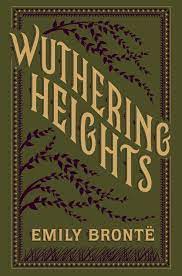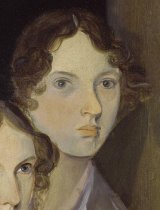Wuthering Heights Page #34
Wuthering Heights is an 1847 novel by Emily Brontë, initially published under the pseudonym Ellis Bell. It concerns two families of the landed gentry living on the West Yorkshire moors, the Earnshaws and the Lintons, and their turbulent relationships with Earnshaw's adopted son, Heathcliff.
“No, you forget, Mrs. Linton,” I suggested, “that you have eaten some food with a relish this evening, and to-morrow you will perceive its good effects.” “If I were only sure it would kill him,” she interrupted, “I’d kill myself directly! These three awful nights I’ve never closed my lids—and oh, I’ve been tormented! I’ve been haunted, Nelly! But I begin to fancy you don’t like me. How strange! I thought, though everybody hated and despised each other, they could not avoid loving me. And they have all turned to enemies in a few hours: they have, I’m positive; the people here. How dreary to meet death, surrounded by their cold faces! Isabella, terrified and repelled, afraid to enter the room, it would be so dreadful to watch Catherine go. And Edgar standing solemnly by to see it over; then offering prayers of thanks to God for restoring peace to his house, and going back to his books! What in the name of all that feels has he to do with books, when I am dying?” She could not bear the notion which I had put into her head of Mr. Linton’s philosophical resignation. Tossing about, she increased her feverish bewilderment to madness, and tore the pillow with her teeth; then raising herself up all burning, desired that I would open the window. We were in the middle of winter, the wind blew strong from the north-east, and I objected. Both the expressions flitting over her face, and the changes of her moods, began to alarm me terribly; and brought to my recollection her former illness, and the doctor’s injunction that she should not be crossed. A minute previously she was violent; now, supported on one arm, and not noticing my refusal to obey her, she seemed to find childish diversion in pulling the feathers from the rents she had just made, and ranging them on the sheet according to their different species: her mind had strayed to other associations. “That’s a turkey’s,” she murmured to herself; “and this is a wild duck’s; and this is a pigeon’s. Ah, they put pigeons’ feathers in the pillows—no wonder I couldn’t die! Let me take care to throw it on the floor when I lie down. And here is a moor-cock’s; and this—I should know it among a thousand—it’s a lapwing’s. Bonny bird; wheeling over our heads in the middle of the moor. It wanted to get to its nest, for the clouds had touched the swells, and it felt rain coming. This feather was picked up from the heath, the bird was not shot: we saw its nest in the winter, full of little skeletons. Heathcliff set a trap over it, and the old ones dared not come. I made him promise he’d never shoot a lapwing after that, and he didn’t. Yes, here are more! Did he shoot my lapwings, Nelly? Are they red, any of them? Let me look.” “Give over with that baby-work!” I interrupted, dragging the pillow away, and turning the holes towards the mattress, for she was removing its contents by handfuls. “Lie down and shut your eyes: you’re wandering. There’s a mess! The down is flying about like snow.” I went here and there collecting it. “I see in you, Nelly,” she continued dreamily, “an aged woman: you have grey hair and bent shoulders. This bed is the fairy cave under Penistone Crags, and you are gathering elf-bolts to hurt our heifers; pretending, while I am near, that they are only locks of wool. That’s what you’ll come to fifty years hence: I know you are not so now. I’m not wandering: you’re mistaken, or else I should believe you really were that withered hag, and I should think I was under Penistone Crags; and I’m conscious it’s night, and there are two candles on the table making the black press shine like jet.” “The black press? where is that?” I asked. “You are talking in your sleep!” “It’s against the wall, as it always is,” she replied. “It does appear odd—I see a face in it!” “There’s no press in the room, and never was,” said I, resuming my seat, and looping up the curtain that I might watch her. “Don’t you see that face?” she inquired, gazing earnestly at the mirror. And say what I could, I was incapable of making her comprehend it to be her own; so I rose and covered it with a shawl. “It’s behind there still!” she pursued, anxiously. “And it stirred. Who is it? I hope it will not come out when you are gone! Oh! Nelly, the room is haunted! I’m afraid of being alone!” I took her hand in mine, and bid her be composed; for a succession of shudders convulsed her frame, and she would keep straining her gaze towards the glass. “There’s nobody here!” I insisted. “It was yourself, Mrs. Linton: you knew it a while since.” “Myself!” she gasped, “and the clock is striking twelve! It’s true, then! that’s dreadful!” Her fingers clutched the clothes, and gathered them over her eyes. I attempted to steal to the door with an intention of calling her husband; but I was summoned back by a piercing shriek—the shawl had dropped from the frame. “Why, what is the matter?” cried I. “Who is coward now? Wake up! That is the glass—the mirror, Mrs. Linton; and you see yourself in it, and there am I too by your side.” Trembling and bewildered, she held me fast, but the horror gradually passed from her countenance; its paleness gave place to a glow of shame. “Oh, dear! I thought I was at home,” she sighed. “I thought I was lying in my chamber at Wuthering Heights. Because I’m weak, my brain got confused, and I screamed unconsciously. Don’t say anything; but stay with me. I dread sleeping: my dreams appal me.” “A sound sleep would do you good, ma’am,” I answered: “and I hope this suffering will prevent your trying starving again.” “Oh, if I were but in my own bed in the old house!” she went on bitterly, wringing her hands. “And that wind sounding in the firs by the lattice. Do let me feel it—it comes straight down the moor—do let me have one breath!” To pacify her I held the casement ajar a few seconds. A cold blast rushed through; I closed it, and returned to my post. She lay still now, her face bathed in tears. Exhaustion of body had entirely subdued her spirit: our fiery Catherine was no better than a wailing child. “How long is it since I shut myself in here?” she asked, suddenly reviving. “It was Monday evening,” I replied, “and this is Thursday night, or rather Friday morning, at present.” “What! of the same week?” she exclaimed. “Only that brief time?” “Long enough to live on nothing but cold water and ill-temper,” observed I. “Well, it seems a weary number of hours,” she muttered doubtfully: “it must be more. I remember being in the parlour after they had quarrelled, and Edgar being cruelly provoking, and me running into this room desperate. As soon as ever I had barred the door, utter blackness overwhelmed me, and I fell on the floor. I couldn’t explain to Edgar how certain I felt of having a fit, or going raging mad, if he persisted in teasing me! I had no command of tongue, or brain, and he did not guess my agony, perhaps: it barely left me sense to try to escape from him and his voice. Before I recovered sufficiently to see and hear, it began to be dawn, and, Nelly, I’ll tell you what I thought, and what has kept recurring and recurring till I feared for my reason. I thought as I lay there, with my head against that table leg, and my eyes dimly discerning the grey square of the window, that I was enclosed in the oak-panelled bed at home; and my heart ached with some great grief which, just waking, I could not recollect. I pondered, and worried myself to discover what it could be, and, most strangely, the whole last seven years of my life grew a blank! I did not recall that they had been at all. I was a child; my father was just buried, and my misery arose from the separation that Hindley had ordered between me and Heathcliff. I was laid alone, for the first time; and, rousing from a dismal doze after a night of weeping, I lifted my hand to push the panels aside: it struck the table-top! I swept it along the carpet, and then memory burst in: my late anguish was swallowed in a paroxysm of despair. I cannot say why I felt so wildly wretched: it must have been temporary derangement; for there is scarcely cause. But, supposing at twelve years old I had been wrenched from the Heights, and every early association, and my all in all, as Heathcliff was at that time, and been converted at a stroke into Mrs. Linton, the lady of Thrushcross Grange, and the wife of a stranger: an exile, and outcast, thenceforth, from what had been my world. You may fancy a glimpse of the abyss where I grovelled! Shake your head as you will, Nelly, you have helped to unsettle me! You should have spoken to Edgar, indeed you should, and compelled him to leave me quiet! Oh, I’m burning! I wish I were out of doors! I wish I were a girl again, half savage and hardy, and free; and laughing at injuries, not maddening under them! Why am I so changed? why does my blood rush into a hell of tumult at a few words? I’m sure I should be myself were I once among the heather on those hills. Open the window again wide: fasten it open! Quick, why don’t you move?”
Translation
Translate and read this book in other languages:
Select another language:
- - Select -
- 简体中文 (Chinese - Simplified)
- 繁體中文 (Chinese - Traditional)
- Español (Spanish)
- Esperanto (Esperanto)
- 日本語 (Japanese)
- Português (Portuguese)
- Deutsch (German)
- العربية (Arabic)
- Français (French)
- Русский (Russian)
- ಕನ್ನಡ (Kannada)
- 한국어 (Korean)
- עברית (Hebrew)
- Gaeilge (Irish)
- Українська (Ukrainian)
- اردو (Urdu)
- Magyar (Hungarian)
- मानक हिन्दी (Hindi)
- Indonesia (Indonesian)
- Italiano (Italian)
- தமிழ் (Tamil)
- Türkçe (Turkish)
- తెలుగు (Telugu)
- ภาษาไทย (Thai)
- Tiếng Việt (Vietnamese)
- Čeština (Czech)
- Polski (Polish)
- Bahasa Indonesia (Indonesian)
- Românește (Romanian)
- Nederlands (Dutch)
- Ελληνικά (Greek)
- Latinum (Latin)
- Svenska (Swedish)
- Dansk (Danish)
- Suomi (Finnish)
- فارسی (Persian)
- ייִדיש (Yiddish)
- հայերեն (Armenian)
- Norsk (Norwegian)
- English (English)
Citation
Use the citation below to add this book to your bibliography:
Style:MLAChicagoAPA
"Wuthering Heights Books." Literature.com. STANDS4 LLC, 2024. Web. 30 Nov. 2024. <https://www.literature.com/book/wuthering_heights_1627>.




Discuss this Wuthering Heights book with the community:
Report Comment
We're doing our best to make sure our content is useful, accurate and safe.
If by any chance you spot an inappropriate comment while navigating through our website please use this form to let us know, and we'll take care of it shortly.
Attachment
You need to be logged in to favorite.
Log In